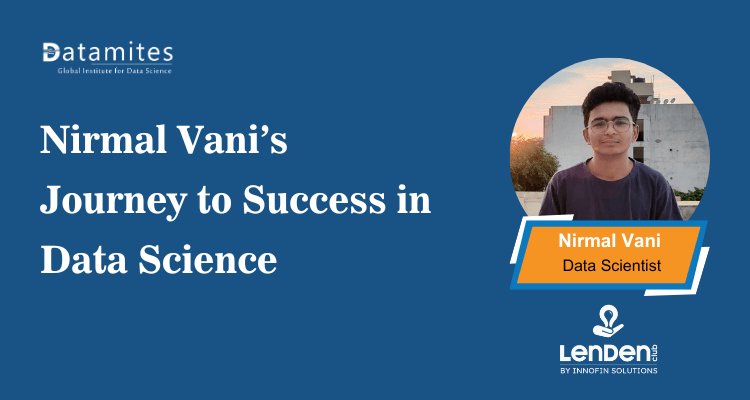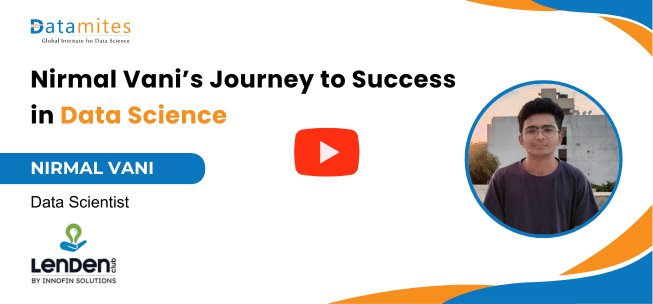Nirmal Vani’s Journey to Success in Data Science
Nirmal Vani’s story shows how dedication and guided learning helped him shift into data science. His journey inspires beginners and career changers alike.

Nirmal’s journey showcases how dedication, structured learning, and practical experience can turn a beginner into a confident data science professional. Coming from a non-technical background, he initially faced challenges in understanding coding and analytics concepts but overcame them through consistent effort and hands-on practice.
By taking up real-world projects, following guided training at DataMites, and applying data-driven solutions, Nirmal gradually built the skills needed to enter the competitive field of data science. His story demonstrates how persistence, the right mentorship, and applied learning can transform career aspirations into reality. Watch DataMites success story to see how Nirmal achieved this remarkable career transition.
How Nirmal Advanced in Data Science with DataMites Training
Discover how Nirmal transitioned from his first interview to securing a data science role, mastering essential skills, and advancing his career with hands-on training and guidance from DataMites.
Q1. Can you introduce yourself and share your background?
Hello, I am Nirmal Vani, 21 years old. I completed my BSc in Mathematics last year. Initially, I worked in the BPO sector for a few months but decided to focus entirely on building a career in data science. I completed my certification with DataMites and did two internships one as a Data Analyst and another in data science projects over six months.
Q2. Why did you choose data science as your career?
After graduation, I explored various industries and discovered the growing demand for data science professionals. My math background made it easier to understand algorithms, and the advice from mentors reinforced that this was the right career path.
Q3. How did you find DataMites?
I researched online and consulted relatives working in IT. They recommended DataMites as a reputable institute for data science training. I visited their center near my home to experience the learning environment and collect materials.
Q4. How challenging was learning Python for you?
Python was initially tough since I did not have a programming background. Learning loops, libraries, and implementing them in real projects took about 2–3 months. Continuous practice helped me become proficient.
Q5. How long did it take you to learn machine learning algorithms?
Machine learning was comparatively easier for me due to my mathematics background. I spent time revising algorithms and understanding the mathematical principles behind them, which helped me implement them confidently in projects.
Q6. What was your learning strategy?
I focused on mastering Python first, then statistics, and finally machine learning. Doing small projects simultaneously helped me apply theoretical knowledge practically. Revising concepts and continuous hands-on practice were key.
Q7. How were your internship experiences?
I completed two internships: first, a data analyst role, where I worked on cleaning data and creating dashboards, and second, a data science internship, where I handled multiple projects, applied machine learning algorithms, and gained practical exposure.
Q8. Did you work in a team for your projects?
Yes, initially, we were five, but ended up as a team of three due to dropouts. Working in a team helped me learn collaboratively and manage real-time project requirements effectively.
Q9. Did you work on live projects?
Yes, I participated in live projects, including performance analysis for managers. This provided real-world experience in implementing data-driven solutions.
Q10. How many job interviews did you attend before landing your first job?
I attended my first interview through DataMites, which perfectly matched my profile. Although I applied to multiple portals, most did not respond. Networking and referrals played a critical role in getting the right opportunity. Fortunately, I was selected in my very first interview at Lenden Club, a fintech company.
Q11. What advice would you give to someone starting their data science career today?
Focus on building strong fundamentals in Python, statistics, and data analysis. Use libraries like NumPy and Pandas, learn visualization techniques, and gradually move to machine learning. Working on projects simultaneously enhances your skills and confidence.
Q12. What were the most difficult concepts for you?
Python programming and certain machine learning algorithms were the most challenging initially. Gaining practical experience through projects made these concepts easier to grasp over time.
Q13. Can beginners from non-technical backgrounds succeed in data science?
Absolutely. Hard work and consistency are more important than background. Even students from non-programming or non-mathematical backgrounds can succeed by dedicating 3–4 hours daily to learning and practice.
Q14: What are the key trends in data science that excite you?
Data science trends such as deep learning, time series forecasting, and large language models continue to evolve. Staying updated and eager to explore new tools is essential, especially for freshers.
Q15. Is a degree mandatory to get a job in data science?
No, a degree is not mandatory. Companies focus more on data science skills and practical knowledge. Candidates without a degree can succeed if they demonstrate strong project experience and proficiency in required tools.
Q16. What resources did you use apart from the DataMites course?
I referred to YouTube tutorials for additional explanations and used ChatGPT as a personal tutor to clarify doubts and learn practical tips. Combining course materials with online resources helped me strengthen my learning.
Q17. What is your advice regarding salary expectations for freshers?
Focus on gaining experience rather than a high package initially. Learning on the job and working on meaningful projects is more valuable than chasing high salaries, which can be achieved later once you gain experience.
Q18. Any final tips for aspiring data scientists?
Be patient, persistent, and dedicated. Build multiple projects, practice regularly, revise concepts, and actively network on platforms like LinkedIn. The combination of skills, practical experience, and perseverance ensures success in this field.
Refer to these articles:
- Saurav’s Journey: From Fresher to Data Scientist
- Tejaswini’s Path to Data Science Success
- Altaf’s Path to Becoming a Senior Data Scientist
Key Lessons from Nirmal Vani’s Data Science Career Journey
Here are the key takeaways from Nirmal Vani’s journey that can guide anyone aspiring to start or advance a career in data science.
1. Non-Technical Background: Nirmal started with a BSc in Mathematics and no programming experience but successfully transitioned into data science.
2. Career Switch Motivation: He chose data science due to growing industry demand and his aptitude for mathematics and analytics.
3. Role of Mentorship: Guidance from mentors and recommendations from relatives helped him identify DataMites as a reliable training institute.
4. Structured Learning Approach: He prioritized mastering Python first, followed by statistics, and then machine learning, combining theory with hands-on practice.
5. Challenges Overcome: Python programming and certain machine learning algorithms were initially difficult but became manageable through consistent practice.
6. Hands-On Experience: Nirmal gained practical exposure through two internships one in data analysis and one in data science projects and participation in live projects.
7. Team Collaboration: Working in a small team helped him manage real-world project requirements and learn collaboratively.
8. Job Search Strategy: Networking, referrals, and aligning interviews with his profile helped him secure his first job at Lenden Club in his very first interview.
9. Advice for Beginners: Focus on fundamentals (Python, statistics, data analysis), use libraries like NumPy and Pandas, work on projects, and dedicate consistent daily practice.
10. Non-Degree Opportunities: A formal degree is not mandatory; skills, project experience, and practical knowledge matter more.
11. Use of Additional Resources: He supplemented learning with YouTube tutorials and ChatGPT for doubt clarification and practical insights.
12. Salary Perspective: Freshers should prioritize gaining experience and project exposure over high starting salaries.
13. Persistence and Consistency: Success in data science requires patience, dedication, continuous learning, and networking.
14. Emerging Trends Awareness: Staying updated on trends like deep learning, time series forecasting, and large language models is important for career growth.
Refer to these articles:
- How to Become a Data Scientist in Pune?
- Data Science Course Fee in Pune
- Data Science Course Fee in Hyderabad
- How to Become a Data Scientist in Hyderabad?
Nirmal Vani’s journey shows that entering data science depends on dedication, structured learning, and hands-on practice. With a BSc in Mathematics and no prior programming experience, he overcame initial challenges through consistent effort, real-world projects, and guided mentorship, successfully transitioning into a data science career.
If you’re starting your journey in data science or planning a career transition, Nirmal’s experience highlights the value of building strong fundamentals, practicing consistently, and gaining hands-on experience. According to Grand View Research, the global data science platform market, valued at USD 96.25 billion in 2023, is expected to grow at a 26% CAGR from 2024 to 2030, fueled by the rapid increase in data generated from digital activities. With industries generating massive volumes of data, the demand for skilled professionals is rapidly increasing, making data science one of the top IT courses today.
Nirmal’s successful career transition was supported by structured training at DataMites. With beginner-friendly courses tailored for non-technical learners, he mastered Python, statistics, and machine learning, gaining hands-on experience through two internships first as a Data Analyst and then in data science projects. Accredited with globally recognized certifications like IABAC and NASSCOM FutureSkills, DataMites equips learners with project experience, expert mentorship, and placement assistance. Choosing a data science course in Hyderabad, Bangalore, Kolkata, Pune, Mumbai, Chennai, or Delhi opens doors to a rewarding and future-ready career.
Whether you’re a fresher, a professional from a non-technical field like Nirmal, or exploring a career switch, DataMites makes high-quality data science education accessible. With both online and offline centers, DataMites offers data science courses in Pune, Mumbai, Bangalore, Chennai, Ahmedabad, Coimbatore, and Hyderabad, along with flexible online learning options. Nirmal’s journey demonstrates that with structured guidance, hands-on learning, and consistent effort, transitioning into data science is not only achievable but also a smart move for a future-ready career.

